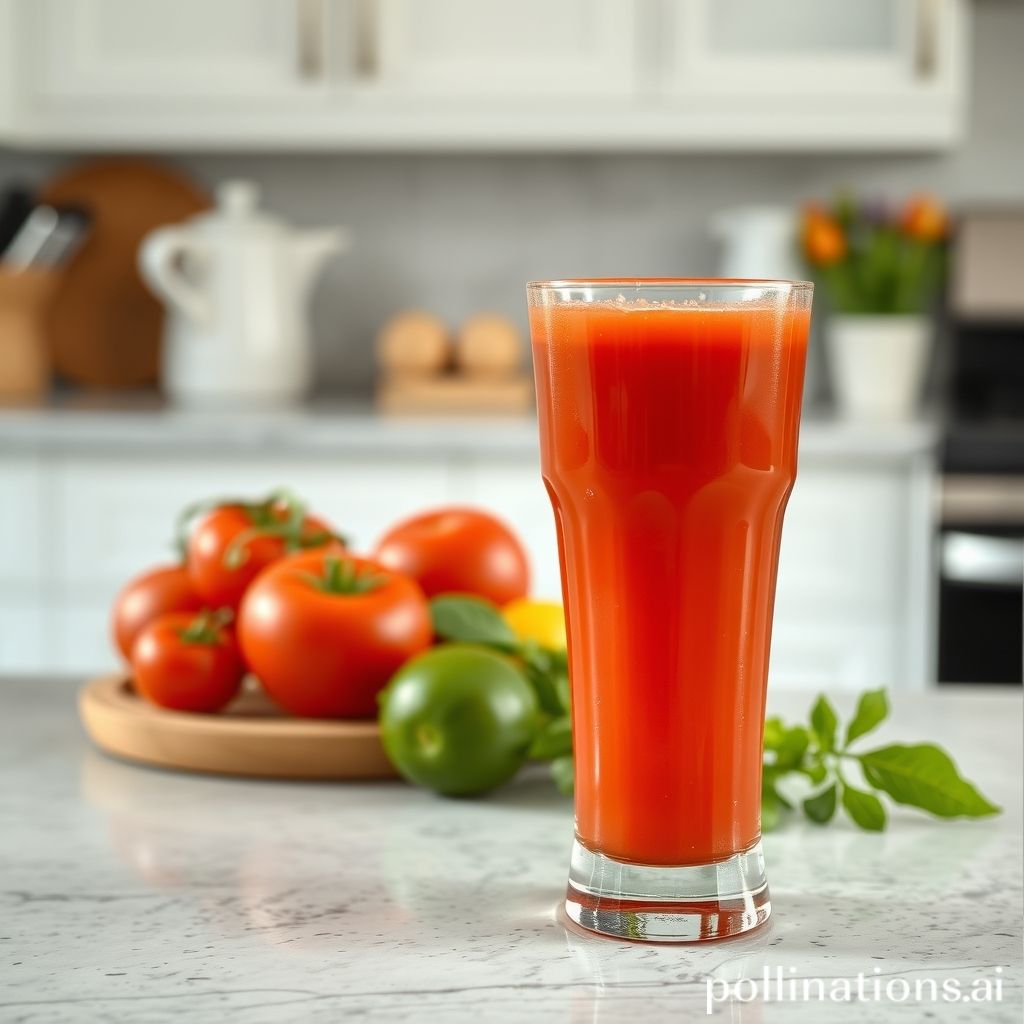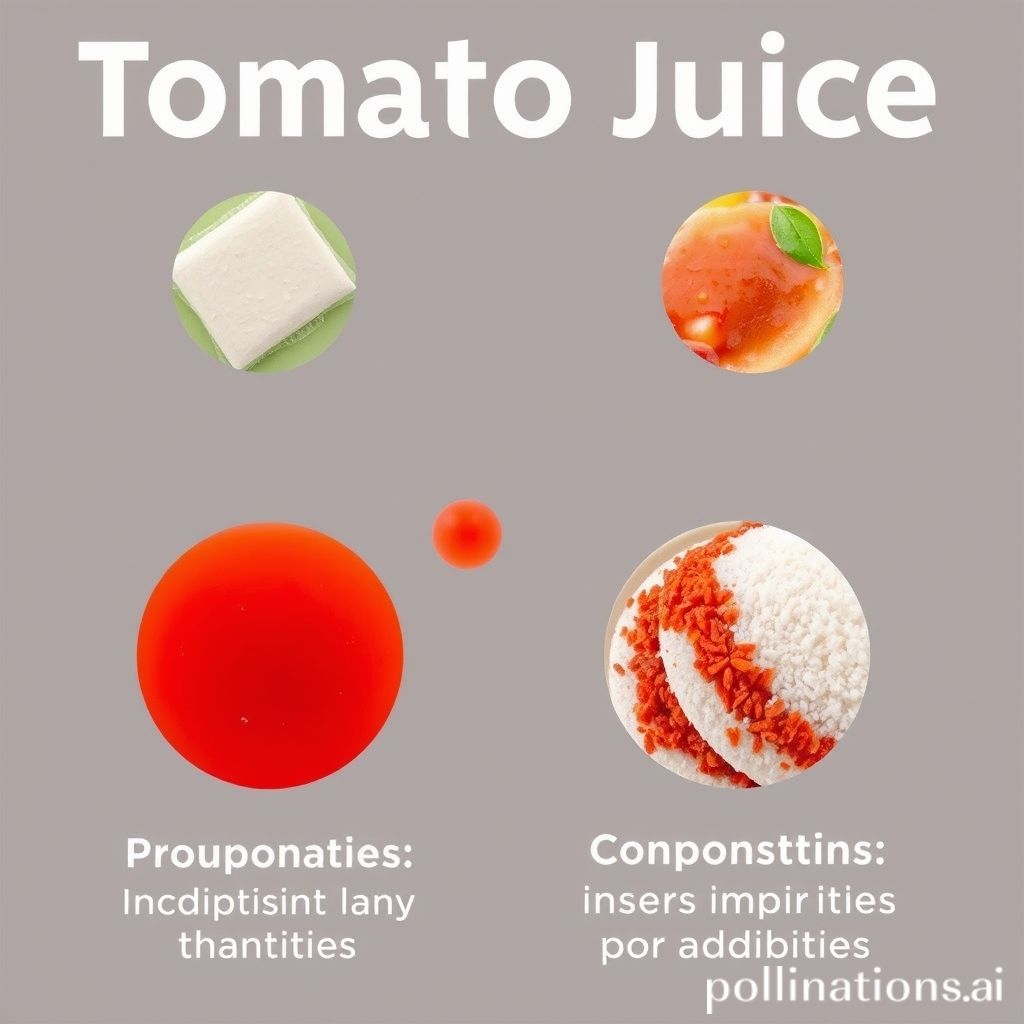Is Tomato Juice A Pure Substance?
[su_note note_color=”#fb8e00″ text_color=”#000000″ radius=”12″]No, tomato juice is not a pure substance as it is a mixture of various compounds and substances found in tomatoes.[/su_note]
Ever wondered what makes tomato juice so refreshing? In this article, we’ll uncover the secrets behind this beloved beverage and answer the burning question: Is tomato juice a pure substance? Discover the factors that affect its purity, the implications of impurities, and find answers to common FAQs.
Whether you’re a fan of tomato juice or simply curious about its composition, get ready to quench your thirst for knowledge and uncover the truth about this tangy delight.

Composition of Tomato Juice
Main Components of Tomato Juice
Tomato juice is primarily composed of several key components that contribute to its unique flavor and nutritional value.
1. Tomatoes: Tomatoes are the main ingredient in tomato juice. They are rich in vitamins, minerals, and antioxidants, such as vitamin C, vitamin A, and potassium.
2. Acids: Tomato juice contains various acids that give it a tangy taste. The most prominent acid is citric acid, which provides a refreshing flavor. It also contains malic acid and oxalic acid.
3. Sugars: Tomato juice naturally contains sugars, including fructose and glucose. These sugars add a subtle sweetness to the overall taste.
Nutritional Content
Tomato juice is not only delicious but also packed with essential nutrients that promote overall health and well-being.
1. Vitamins: Tomato juice is an excellent source of vitamins, particularly vitamin C and vitamin A. Vitamin C boosts the immune system, while vitamin A supports healthy vision and skin.
2. Minerals: Tomato juice is rich in minerals necessary for proper bodily functions. It contains potassium, which regulates blood pressure, as well as smaller amounts of calcium, magnesium, and iron.
3. Antioxidants: Tomato juice is high in antioxidants, which protect the body against free radicals and reduce the risk of chronic diseases. Antioxidants also promote cellular health.
Water Content
Water is a significant component of tomato juice, contributing to its liquid consistency and hydrating properties. Tomato juice typically contains around 90% water, making it a refreshing and thirst-quenching beverage.
In conclusion, tomato juice consists primarily of tomatoes, acids, sugars, and water. It provides essential vitamins, minerals, and antioxidants, making it a valuable addition to a balanced diet. Enjoy a glass of tomato juice to reap its numerous health benefits and savor its refreshing taste.
[su_highlight background=”#f6b40f”]Boost your health with tomato juice – packed with vitamins, minerals, antioxidants, and hydrating properties![/su_highlight]
Properties of Tomato Juice
Color and Appearance
Tomato juice is characterized by its bright red color, which is visually appealing and indicative of its freshness. It has a clear or slightly cloudy appearance, depending on the processing method and the presence of pulp.
Taste and Aroma
The taste of tomato juice can be described as sweet and tangy, with a pleasant balance between the natural sweetness of tomatoes and a subtle tanginess. It offers a refreshing flavor that is enjoyed by many. Additionally, tomato juice has a distinctive aroma that is reminiscent of fresh tomatoes, adding to its appeal.
Texture and Consistency
Tomato juice has a smooth and liquid consistency, making it easy to drink without any noticeable chunks or solid particles. This smooth texture contributes to its refreshing nature, making it a popular choice for hydration.
To provide additional information, here is an HTML table highlighting the properties of tomato juice:
| Property | Description |
|---|---|
| Color | Bright red |
| Appearance | Clear or slightly cloudy |
| Taste | Sweet and tangy |
| Aroma | Distinctive tomato |
| Texture | Smooth and liquid |
| Consistency | Thin |
Tomato juice possesses distinct properties that contribute to its appeal. Its bright red color, sweet and tangy taste, distinctive aroma, smooth texture, and thin consistency make it a refreshing and enjoyable beverage.
Is Tomato Juice a Pure Substance?
Definition of a Pure Substance
A pure substance is a type of matter that has a uniform composition and distinct properties. It is composed of only one type of atom or molecule and cannot be separated into simpler components by physical means. Pure substances can exist in various forms, such as elements or compounds.
Analysis of Tomato Juice Composition
Tomato juice, derived from fresh tomatoes, is a popular beverage known for its refreshing taste and nutritional benefits. It is primarily composed of water, which makes up the majority of its content. Additionally, tomato juice contains various organic compounds, including sugars, vitamins, minerals, and phytochemicals.
Sugars: Tomato juice naturally contains sugars like glucose and fructose, which contribute to its slightly sweet taste.
Vitamins and Minerals: Tomato juice is a good source of essential vitamins such as vitamin C, vitamin A, and vitamin K. It also contains minerals like potassium and magnesium, which are important for maintaining proper bodily functions.
Phytochemicals: Tomatoes are rich in phytochemicals, such as lycopene, beta-carotene, and flavonoids. These compounds have antioxidant properties and may offer potential health benefits.
Presence of Impurities or Additives
While tomato juice is primarily composed of natural components, it may contain certain impurities or additives depending on the manufacturing process or brand. Common additives include salt, citric acid, and preservatives to enhance flavor and extend shelf life. It is important to check the ingredient list and choose tomato juice without unnecessary additives if desired.
In conclusion, tomato juice is not considered a pure substance in the strictest sense as it consists of a mixture of various compounds. However, it is a wholesome and nutritious beverage that can be enjoyed as part of a balanced diet.

Factors Affecting Purity of Tomato Juice
1. Processing Methods
The processing methods used in the production of tomato juice have a significant impact on its purity. Techniques such as hot filling, cold filling, or aseptic processing can be employed. Each method affects the overall quality and purity of the juice differently.
2. Storage Conditions
Proper storage conditions are crucial for maintaining the purity of tomato juice. Factors like temperature, light exposure, and air contact can affect its quality over time. It is recommended to store tomato juice in cool and dark environments, preferably in airtight containers, to preserve its freshness and prevent the growth of harmful microorganisms.
3. Quality Standards
Adhering to quality standards is essential to ensure the purity of tomato juice. Regulatory bodies and organizations establish guidelines and specifications that manufacturers must meet. These standards cover aspects such as the absence of contaminants, accurate labeling, and reliable nutritional information. By following these standards, consumers can have confidence in the purity and safety of the tomato juice they consume.
To provide additional informational value, here is an HTML table summarizing the factors affecting the purity of tomato juice:
| Factors Affecting Purity of Tomato Juice |
|---|
| Processing Methods |
| Storage Conditions |
| Quality Standards |
In conclusion, the purity of tomato juice is influenced by processing methods, storage conditions, and adherence to quality standards. By considering these factors, consumers can make informed choices and enjoy tomato juice that is both pure and of high quality.
[su_note note_color=”#ea2e0c” text_color=”#ffffff” radius=”8″]Extra Tips: Ensure the purity of your tomato juice by choosing proper processing methods, storage conditions, and following quality standards.[/su_note]
Implications of Tomato Juice Purity
Health Benefits of Pure Tomato Juice
Consuming pure tomato juice offers many health benefits. Pure tomato juice is packed with essential vitamins, minerals, and antioxidants that promote overall well-being. Some key advantages of pure tomato juice include:
- Rich source of lycopene: Tomato juice has a high lycopene content, which is a powerful antioxidant that may reduce the risk of chronic diseases, including certain types of cancer.
- Boosts heart health: Regularly consuming pure tomato juice has been linked to a lower risk of heart disease. It helps lower cholesterol levels and maintain healthy blood pressure.
- Supports digestion: Tomato juice contains dietary fiber, which aids in digestion and promotes a healthy gut.
- Strengthens immune system: Vitamins A and C found in tomato juice play a crucial role in strengthening the immune system, helping the body fight off infections and illnesses.
Effects of Impurities on Taste and Quality
The presence of impurities in tomato juice can significantly affect its taste and overall quality. Here are some notable effects:
- Altered flavor: Impurities in tomato juice can introduce undesirable flavors, resulting in a less enjoyable taste.
- Reduced nutritional value: Impurities may reduce the nutritional content of tomato juice, decreasing its potential health benefits.
- Potential health risks: Certain impurities, such as harmful bacteria or contaminants, can pose health risks if consumed. It is crucial to ensure the purity of tomato juice to avoid such hazards.
- Decreased shelf life: Impurities can speed up spoilage and reduce the shelf life of tomato juice, compromising its freshness and quality.
To fully appreciate the health benefits and enjoy the authentic taste of tomato juice, it is important to choose a product that guarantees purity and quality.
Conclusion
The purity of tomato juice is vital for understanding its composition and ensuring its quality. Tomato juice is not a pure substance, as it contains various components and may have impurities or additives. Factors like processing methods, storage conditions, and adherence to quality standards can affect the purity of tomato juice.
Opting for tomato juice made from fresh tomatoes without preservatives is crucial for reaping its health benefits. Homemade tomato juice may offer a purer option compared to store-bought varieties. While impurities in tomato juice might not be harmful, they can impact the taste and overall enjoyment of the beverage.
[su_divider]
Faq about Tomato Juice
FAQ 1: Is tomato juice made from fresh tomatoes?
Yes, tomato juice is made from fresh tomatoes that have been juiced and strained.
FAQ 2: Can tomato juice contain preservatives?
Yes, some commercially produced tomato juices may contain preservatives. However, preservative-free options are also available.
FAQ 3: How long does tomato juice stay fresh?
The freshness of tomato juice depends on the method of preparation and storage conditions. Homemade tomato juice can stay fresh for up to 5-7 days when stored in a sealed container in the refrigerator. Store-bought tomato juice usually has a longer shelf life, with the expiration date indicated on the packaging.
FAQ 4: Is homemade tomato juice purer than store-bought?
Homemade tomato juice is often considered purer than store-bought options because it allows you to control the ingredients and avoid additives or preservatives. However, store-bought tomato juice can still be a convenient and healthy option if you choose a brand that uses high-quality ingredients and minimal processing.
FAQ 5: Can impurities in tomato juice be harmful?
The impurities found in tomato juice, such as small particles or sediment, are generally harmless and can be strained or filtered out. However, if you notice any unusual odors, colors, or tastes in your tomato juice, it is advisable to discard it as it may indicate spoilage or contamination. Always check the quality and freshness of the tomato juice before consuming.
